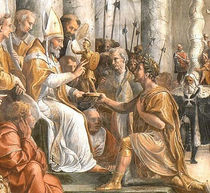The Catholic Defender: The Apostle James (The Less) Suffered Martyrdom
- Donald Hartley

- May 2, 2023
- 5 min read

St. James the Less is noted as "Less" to distinguish him from James, the brother of St. John and the son of Zebedee who is called James the "Greater". The reason being that James the Less was a younger man and age has it's rank and privilege.
The better translation would be James the younger.
Today's story is about James the Less who was the son of Cleopus (John 19:25) also known as Alphaeus, and Mary, a close relative of the Virgin Mary. James was a cousin of Jesus who was often times referred to as a brother of the Lord. Close relatives were regarded as brothers in those times and in that culture (Matthew 13:55, Mark 4:6, Galatians 1:19).
Interestingly, St. Luke never calls James the Less as the brother of the Lord, but the son of Alphaeus. St. Luke was a Greek Gentile and convert.
According to tradition, St. James and his brother Jude Joined Jesus in his second year of public Ministry, he is mentioned as one of the Disciples (Matthew 10:3, Mark 3:18, Luke 6:15).
According to St. Paul, James was a witness to the Resurrection of Jesus and that James was a pillar of the Catholic Church.

He was with the Apostles in the Upper Room when Jesus appeared to them that first Easter Sunday.
James is mentioned along with the other Apostles (Acts 1:13) choosing Matthias to replace Judas Iscariot.
According to St. Jerome, Jesus called for St. James to be the first Bishop of Jerusalem before ascending up to heaven. That would be a divine installment.
St. James is noted being the first Bishop of Jerusalem and hosted the Council of Jerusalem in 49 A.D. and gave the concluding remarks: "Brethren, listen to me. Simeon has related how God first visited the Gentiles, to take out of them a people for his name. And with this the words of the prophets agree, as it is written, 'After this I will return, and I will rebuild the dwelling of David, which has fallen; I will rebuild its ruins, and I will set it up, that the rest of men may seek the Lord, and all the Gentiles who are called by my name, says the Lord, who has made these things known from of old.' Therefore my judgment is that we should not trouble those of the Gentiles who turn to God, but should write to them to abstain from the pollutions of idols and from unchastity and from what is strangled and from blood. For from early generations Moses has had in every city those who preach him, for he is read every sabbath in the synagogues." (Act's 15:13-21)

It is important to note here that St. Peter has the final authority being the leader of the Apostles. Catholic convert and Scholar, Scott Hahn states, “He (Peter) formulates a doctrinal judgment about the means of salvation, whereas James takes the floor after him to suggest a pastoral plan for inculturating the gospel in mixed communities where Jewish and Gentile believers live side by side." In other words, James concurs with Peters words and then addresses how to implement them.
During those early years, St. James governed the Church in Jerusalem during a time of persecution. Yet, St. James never lost his integrity, he maintained a high degree of sanctity. As a Jew, he was trained to be a "Nazarite", one consecrated to God just like Sampson and St. John the Baptist. He never shaved nor cut his hair nor took strong drink.
When St. James prayed, he often obtain instant results such as calling for rain.
In the Spring of 62 A.D. (April 10), according to St. Eusebuis and Jerome, the Jewish High Priest Herod Agrippa II decided to arrest St. James and force him to deny Jesus. St. James was taken to the high wall to stand on the Temple wall facing the crowd below who had gathered for Passover.
Herod threatened James calling for a denial, but James gave a great testimony before the people telling them of Jesus. James proclaimed that Jesus is the Son of Man, was seated at the right hand of the Sovereign Majesty, and would come in the clouds of heaven to judge the world. St. James was basically repeating what Jesus had said during the mock trial (Matthew 26:64).

The Pharisees in anger threw James off the Temple wall, despite the terrible fall, James was able to struggle to his knees lifting his eyes to heaven begging God to forgive those who attacked him. He was following what Jesus had said as well as St. Stephen. The Temple police were ready with rocks and pelted James with rocks, yet he did not die.
Finally, James fell due to a blow on his head from a man with a club used for beating out rugs and cloths. His last words were for his forgiveness to those who attacked him. At age 66 James served as Bishop of Jerusalem for nearly 30 years.
The Epistle of St. James in the New Testament was written not long before his death in 62 A.D. to encourage the Church scattered out into the world.
Saint Jerome wrote of St. James sanctity: "He was always a virgin, and was a Nazarite, or one consecrated to God. In consequence of which he was never shaved, never cut his hair, never drank any wine or other strong liquor; moreover, he never used any bath, or oil to anoint his limbs, and never ate of any living creature except when of precept, as the paschal lamb: he never wore sandals, never used any other clothes than one single linen garment. He prostrated so much in prayer, that the skin of his knees and forehead was hardened like to camels' hoofs."
One of my favorite passages from the book of James is James 1:19-25, "Know this, my beloved brethren. Let every man be quick to hear, slow to speak, slow to anger, for the anger of man does not work the righteousness of God. Therefore put away all filthiness and rank growth of wickedness and receive with meekness the implanted word, which is able to save your souls. But be doers of the word, and not hearers only, deceiving yourselves. For if any one is a hearer of the word and not a doer, he is like a man who observes his natural face in a mirror; for he observes himself and goes away and at once forgets what he was like. But he who looks into the perfect law, the law of liberty, and perseveres, being no hearer that forgets but a doer that acts, he shall be blessed in his doing."





















Comments